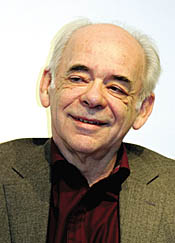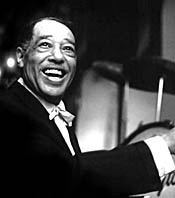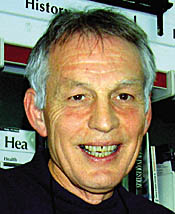|
|
 |
| |

Alan Plater

Duke Ellington

• Piers Plowright is an award-winning BBC drama and
documentary producer. He lives in Well Walk in Hampstead.
|
Rambling good times of a true jazz lover
Playwright Alan Plater says
he is fuelled by jazz especially his hero Duke Ellington,
writes Piers Plowright
Doggin’ Around by Alan Plater
Northway Publications, £6.99
SEVEN years ago, Alan Plater wrote a love-letter to the jazz
great Duke Ellington. The great man had been dead a long time
but that wasn’t the point. He was taking part in a Radio
4 series in which various people were invited to write letters
to an icon of their choice and for Plater that was Ellington.
Because he had style, because he had wit, and, above all, because
he played great music.
Plater fell in love with jazz in the early 1940s soon after
his family moved from Jarrow to Hull and with live jazz in a
youth club 10 years later when he heard the Port of Hull Jazz
Band in full cry. He’s put it into his radio and TV plays
and musicals, he’s written about it brilliantly and he’s
spent half his life in Ronnie Scott’s.
Now we have this book – well not so much a book, more a
series of prose rambles, ‘doggin’ around’ the
people, places and poetry of his life so far. It wasn’t,
he says, meant to be an autobiography, but it will do nicely.
And it’s full of jazz.
Alan Plater, who lives in Tufnell Park, has been cheering up
our culture for more than 40 years now. For TV, think Z Cars,
Barchester Chronicles and The Beiderbecke Trilogy; for Radio,
a flood of talks and plays, including his trilogy about a dynasty
of feisty Welsh jazzwomen, The Devil’s Music. On stage,
Close the Coalhouse
Door, Rent Party, and Going Home. He’s also an inspiring
lecturer.
I remember sitting in an audience spellbound by the way he related
the small things of life – his grandfather’s ring,
the boredom of sitting in a police patrol car all night when
nothing happens (an episode of Z Cars came out of that), the
sound of someone singing the blues in a Leeds back street –
to the act of creation.
Doggin’ Around is full of such moments. Some great stories
too. How he wasn’t quite hired by John Lennon to write
the screenplay for a film about the 1962 A6 murder. John and
Yoko couldn’t have been nicer but after the first meeting
there was no other. About his own early appearance on stage
during the Newcastle University student rag-week – Plater
was failing to study architecture – as part of an invisible
juggling troupe called the Forty-four Flying Fletchers (there
were only three of them). The occasion when, owing to a schedule
mix-up, Hull Local Radio prevented the citizens of that city
from listening to Radio 2’s coverage of the Henry Cooper
versus Joe Bugner heavyweight fight.
They were treated instead to the late great Joe Harriott playing
Perdido. Not quite the same thing. And there’s Plater’s
hymn to the motorway network of the UK, and his verbal version
of Zoot Sims playing Cherokee and… but you must get the
book. Like a lot of good writers, Alan Plater always wanted
to be someone else: James Thurber, Saul Steinberg, Dylan Thomas,
and, of course, The Duke. He’s not done badly: some of
Thurber’s surreal wit survives in him, he can draw pretty
well (viz the illustrations in this book), and he shares with
Dylan a sharp eye and the love of a good boozer.
As far as I know, he doesn’t play the piano or compose
to the Duke’s standards, but the spirit of his hero informs
everything he does. “My approach to dramatic structure,”
he writes, “is to play Duke Ellington’s 1940 version
of ‘Harlem Air Shaft’ which contains all you need
to know about dramatic structure, if you have ears to listen.”
Alan Plater has the ears all right. It’s music that fuels
him. And it’s good to be reminded, in this age of the eye,
that listening is what sometimes makes the difference between
civilisation and chaos, between beauty and brutality.
On the last page of this entertaining elegy, Plater describes
what he and his wife, Shirley, do when a new baby is born to
family or friends: they put on the Thad Jones/Mel Lewis recording
of A Child is Born. “The message is simple as the blues
itself: in good times or bad we must embrace beauty.” |
|
 |
|



